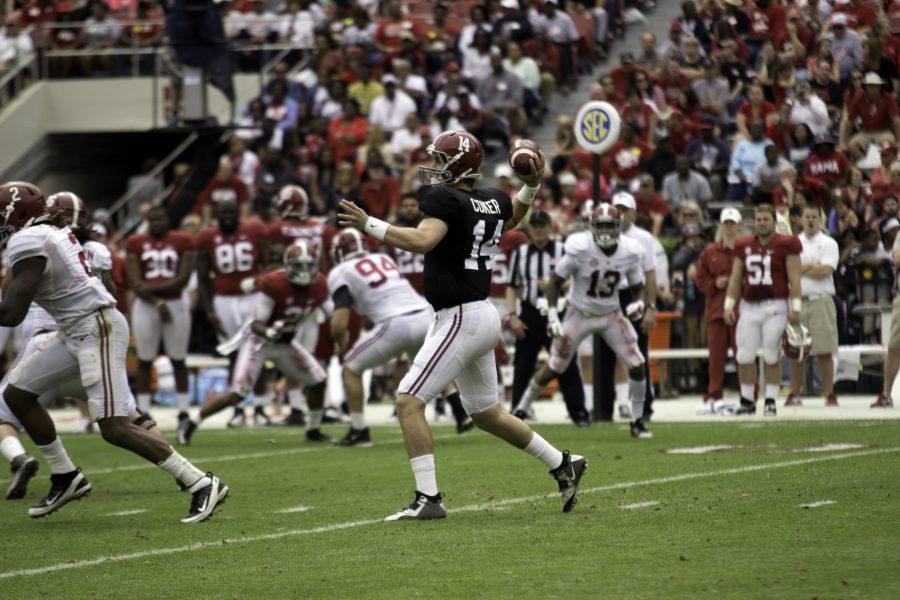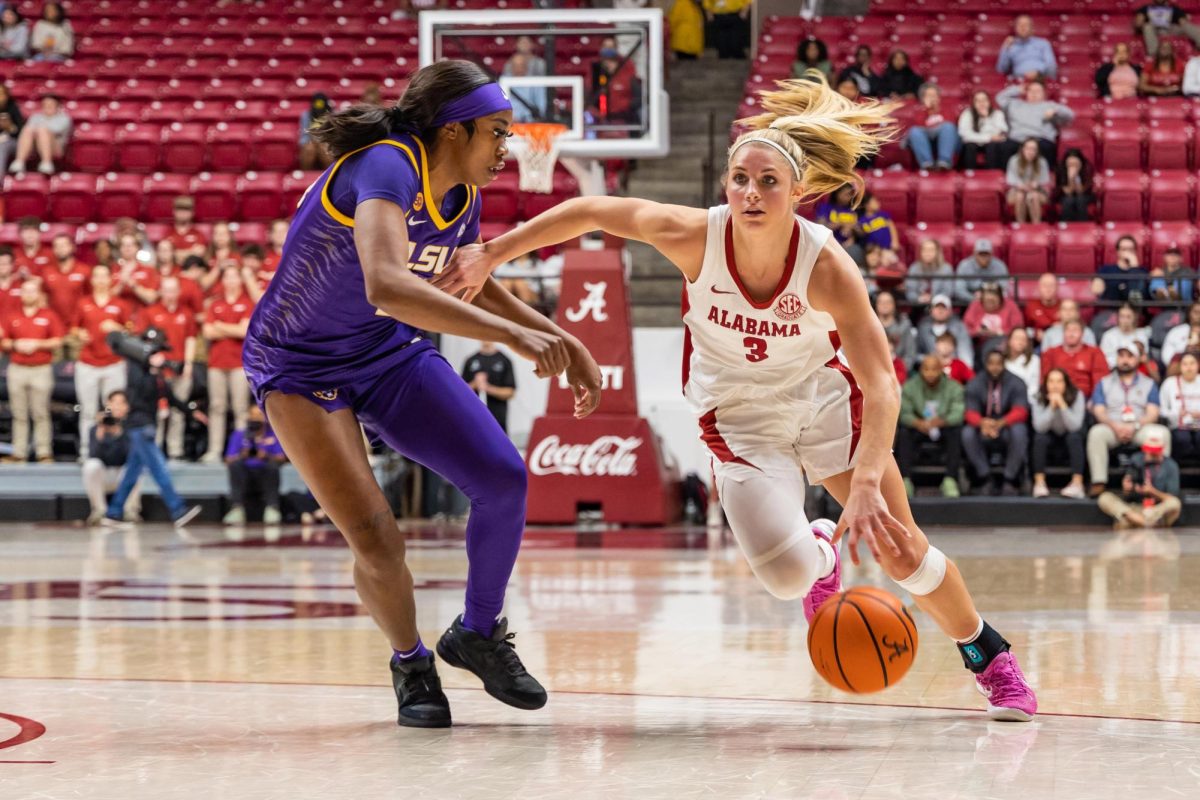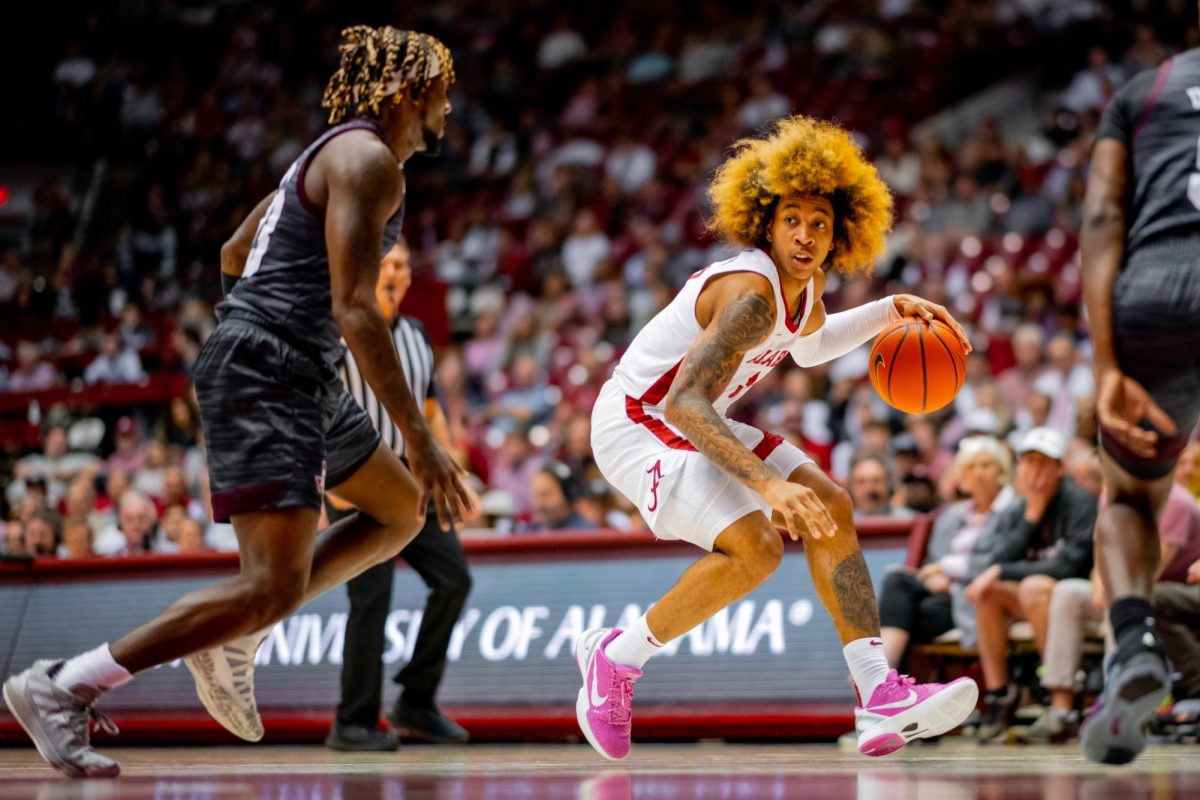Anticipation ran rampant throughout Tuscaloosa on Nov. 30, 2014. Fans fueled by the thought of revenge against the Auburn Tigers filed into Bryant-Denny Stadium on the late fall Saturday, ready to see their team regain its dignity after the demoralizing “kick six” that punctuated the Iron Bowl during the season prior.
As the game progressed, it became clear Alabama’s path to vengeance might not be quite as clear as anticipated. Entering halftime, Auburn led the Crimson Tide 26-21 in Tuscaloosa. After a third interception from quarterback Blake Sims in the start of the third quarter, backup Jake Coker began warming up on the sidelines, but the Florida State transfer never saw the field.
Sims went on to lead five consecutive touchdown drives to give Alabama a 55-44 win over its in-state rival, once again erasing doubts that had followed him throughout his single season as a starter.
Much like Alabama’s fate in the highest scoring Iron Bowl in history, the 2014 quarterback battle was, for quite some time, uncertain. While fall camp saw the arrival of Coker, heralded for his skills by FSU coach Jimbo Fisher, he never could quite lock up the position that many deemed his for the taking. Instead, fall camp and early season games featured a constant question mark at arguably the most important position on the team.
This season, the Crimson Tide faces the same question mark as the season prior. Again, though Coker has seemingly been a leader in contention for the position throughout the offseason, the perceived lineup has shifted often. On Monday, Alabama released its depth chart for the upcoming season opener against Wisconsin on Saturday, but no answers were given as to who will win the position.
Coker, sophomore Cooper Bateman and junior Alec Morris were all listed as first team options, while true freshman Blake Barnett and redshirt freshman David Cornwell rounded out the second team spots. Coach Nick Saban said the team would share reps between the top three candidates this week.
“I’m confident in these guys,” Saban said. “I’m confident that they can play well in this game. And I just would like to see somebody win the team over, which may not happen until they play. When you have guys that haven’t played before, I think that’s always the case.”
Despite the uncertainty, Saban addressed the positives of each of the leading three contenders.
“I’ve been really pleased with all three of the quarterbacks that have taken some reps in practice,” Saban said in his address to the media on Monday. “Jake has really done a good job of getting the ball out of his hands and seems to be more comfortable with the offense. Cooper Bateman is more athletic. [He’s] really improved as a passer and done a really good job of executing. Alec is very, very comfortable in running the offense in terms of knowledge and experience and that type of thing.”
Absent from the current conversation is Cornwell, who, at one point this summer, seemed to emerge as a legitimate competitor for the vacated spot. Various media outlets, including FoxSports and ESPN hinted that the four-star recruit could very well land the starting job before the season began, and he received praise form Saban at various times throughout the spring.
“He has done as good a job as anybody this spring, in terms of he is very bright,” Saban said. “He has a great understanding of the offense. He does a great job from the leadership standpoint of helping other players play better when he is in there.”
Following the team’s final fall scrimmage, Saban addressed passes attempted by all quarterbacks, except Cornwell.
Historically, the role of an Alabama quarterback has seen a changing definition. While the program has produced legends such as Joe Namath, Bart Starr and Ken “The Snake” Stabler, in recent history, the player under center has taken on a role of game manager, rather than gunslinger.
The “game manager” term was quick to draw ire from former Alabama quarterback AJ McCarron in 2012, the year after the three-year starter emerged from quarterback ambiguity. The term, he said, is inherent in the definition of a successful quarterback, regardless of his style of play.
Following the 2014 Iron Bowl, Sims, a former question mark, went on to set the single-season record for passing yards at the University, effectively changing the identity of the Crimson Tide offense. As for this team’s offensive identity, only one thing is certain: until somebody “takes the bull by the horns,” as Saban said earlier this spring, expect uncertainty.









